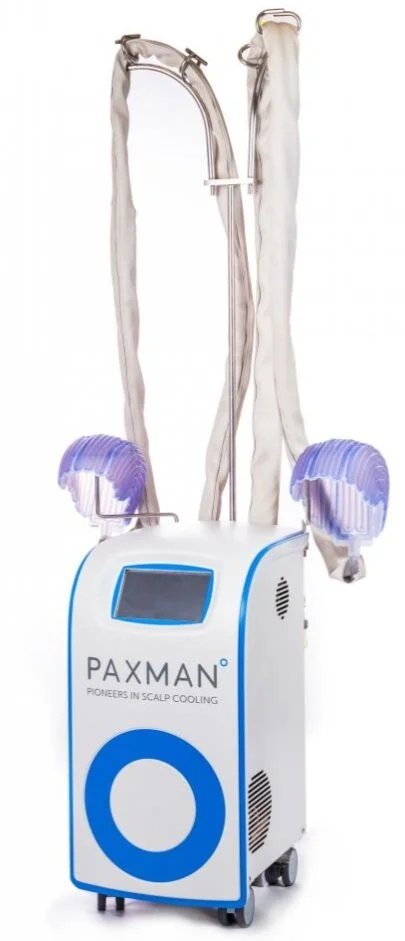How Knowledgeable are Dermatologists about Scalp Cooling?
Scalp Cooling has an important role in preventing hair loss during chemotherapy. In 2015, the Dignicap was approved and in 2017 the Paxman Cooling System was approved.
The Key Scalp Cooling Studies en Route to FDA Clearance
I’d like to review two of the key studies that helped the Dignicap and Paxman Cooling System get approved.
In the Dignicap study, 67 of 101 women in the study who used the DigniCap Scalp Cooling System (66.3%) lost less than half of their hair, when followed for a month after the last chemotherapy cycle. In comparison, all women who did not receive scalp cooling lost more than half of their hair. The most common chemotherapy regimen was docetaxel/cyclophosphamide for 4-6 cycles.
In the Paxman trial, patients receiving scalp cooling wore the device for 30 minutes before their chemotherapy treatment, for the duration of their treatment, and for 90 minutes following treatment. These women had stage 1 or 2 breast cancer and were receiving a broader range of chemotherapies. Out of the 95 patients who used the Paxman device, 48 (50.5 percent) lost less than 50 % of their hair (meaning no wig or scarf was needed, compared to 0 (0 percent) in the no cooling group.
The Paxman Cooling System was FDA cleared in 2017 to prevent hair loss from chemotherapy. I thank Richard Paxman for sharing this photo.
Yin et al, 2022: Important Knowledge Gaps Identified from Surveyed Dermatologists
Yin and colleagues conducted an anonymous online survey of 82 board-certified dermatologists. 54 respondents ultimately agreed to completed the survey. Thirty-eight (70.4%) were general dermatologists and 15 (27.8%) were specialized in hair disorders. 22.2% were very familiar with scalp cooling, 66.7% heard of the concept of scalp cooling but were not very familiar, and 11.1% were not familiar. When data was evaluated according to practice type, 35.7% of individuals at a university hospital and 8.7% at a private hospital or private practice were very familiar with its role in CIA prevention.
75.9% of respondent expressed an interest to have more education in the area of scalp cooling.
Of 34 respondents affiliated with a cancer center, 73.5% did not know the scalp cooling therapies their facility offered, and 65.0% indicated they would “probably” or “definitely” support their institution providing scalp cooling systems. The most common reasons cited for opposing scalp cooling systems were efficacy (33.3%), safety concerns (16.7%) and side effects (16.6%).
A total 81.5% of the 54 respondents “somewhat” or “strongly” agreed that the effects of hair loss on cancer patients were a major concern.
Comments
This study is interesting as it shows several important gaps that exist among dermatologists. Despite the fact the hair loss is viewed by patients as one of the most distressing parts of having chemotherapy, about 1 in 5 dermatologists did not seem to appreciate the importance of this concern.
It’s wonderful to see the interest among dermatologists to learn more as this will likely help close some of these knowledge gaps.
REFERENCE
Yin et al. Dermatologist Awareness of Scalp Cooling for Chemotherapy-induced Alopecia. J Am Acad Dermatol . 2022 Mar 9;S0190-9622(22)00386-3.
This article was written by Dr. Jeff Donovan, a Canadian and US board certified dermatologist specializing exclusively in hair loss.

